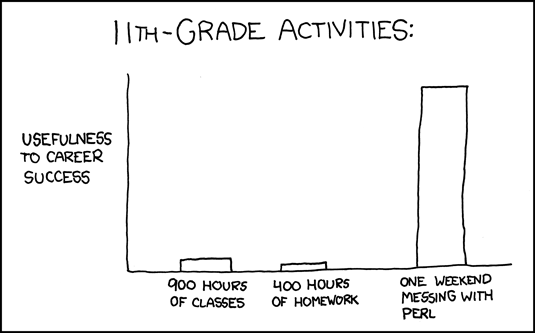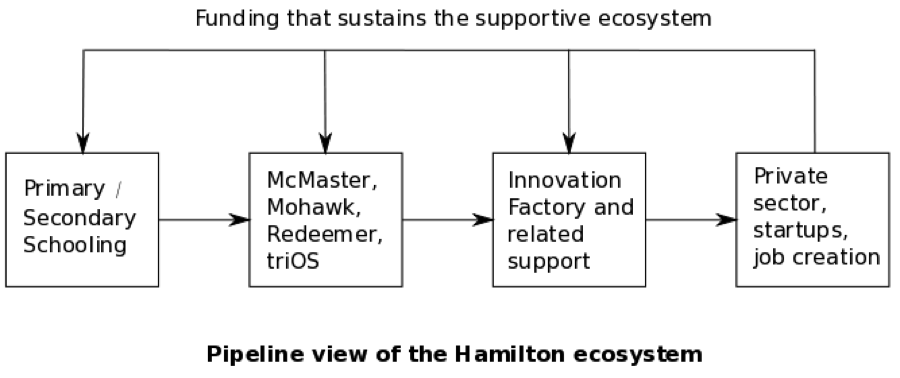Improving Hamilton-area early software development education
If you’re a regular reader of this blog you’ll probably have come across articles in the past talking about the importance of increasing and improving Hamilton-area software development education. Software has become the driving force of private sector job creation, as computing fields will make up 71% of STEM jobs created through 2018. With over 100 jobs in the Software Hamilton job board in 2013 and local developer salaries ranging from $50k – $100k+, there’s a huge opportunity for the 50% of Hamiltonians working part-time, contract or unpaid work to step into a growing industry. While it’s a grossly oversimplified view of the ecosystem due to people entering and exiting the pipeline at different stages, at the end of the day the “backbone” of our ecosystems looks something like this:
While we often focus on the end of the pipeline because that’s the most easily observable point of job creation and ROI, the skills and abilities that enable that job creation develop much earlier. The ecosystem’s performance is ultimately bounded by the quality of its input. If there were to be a surge in the number of youth learning software development at a high level, it would have a cascading effect throughout the ecosystem as top students go on to become top founders, researchers and developers. That’s why an emphasis on early software education in particular is so critical to the ecosystem.
I called the University of Waterloo and found out that they are admitting about 10x the number of Waterloo-region students into their computer science program than McMaster will admit Hamilton-region students into its computer science program this year (30 in Waterloo vs. about only 3 here according to the survey results). The Waterloo-region put a focus on early math and computer science education in the 1960s, and by the 1980s the University of Waterloo was graduating 1/3 of Canada’s computer science graduates.
Bill Gates is a great specific example. Microsoft employs 40,000 people in Bill Gate’s hometown of Seattle, but he became a programming wizard due to having regular access to a computer during high school (facilitated by a charitable donation). If you want a specific example closer to home, notice how Printchomp CEO Joseph Puopolo mentions a computer camp and early access to a computer in his article about the Waterloo ecosystem.
It involves taking a 20-year view of the ecosystem, but early and beginner software development education is of absolutely paramount importance.
We must do better. Thankfully there are two ongoing parallel movements that are improving early software development education. Firstly, there are many new fun and effective online resources for children, women and men to learn computer programming, often from right inside the browser, for example Khan Academy and Codecademy. Secondly, many non-profits are running one-off “kids learning code” or “hackjam” days where children get to learn computer science concepts, and various regularly occurring code clubs such as CodeClubs, CoderDojo, After-School Programming are opening volunteer-run chapters in cities around the world.
I’ve added a learn section to the blog, documenting what online resources are available and what local programs exist to improve early and beginner software development education.
Principals and teachers have asked me about how they can host code clubs, and local students and developers have asked me about running them. Non-profits running one-off events have asked me to find developers to volunteer at these events. I want to try to enable more beginner software education in Hamilton by connecting those teachers and principals who want code clubs in their schools with those in the community who are interested in running them. I also want to start connecting developers interested in volunteering at educational events with the people running them.
So if you’re interested in volunteering at one-off educational events, or becoming a lead organizer of a local code club, you can sign-up for the volunteer opportunity newsletter. I’ll blast out notifications about volunteer opportunities with local non-profits, and when teachers or principals are looking to “champion” a coding club at their school I’ll try to connect them to those interested in running these clubs.
In terms of immediate opportunities to help out, there are two upcoming. I’ll post more details about these ASAP, but for now:
Mozilla Pop-up Event
The goal of this event will be to promote interactive learning, one of the most effective ways to ensure understanding and retention of knowledge. Our tech fair will introduce youth to digital literacy through hands on experience in an open and inclusive learning environment.
Each of our partners in this even will be asked to create a fun, interactive, learning table where youth can explore new ideas and technologies. The overall theme of the day will be “Story Maker.” This theme is broad enough that a number of different ideas can be molded into individual activities, and is one that is also meant to appeal to the imagination of our participants.
When: Saturday November 30 from 12:00pm until 4:30pm
Where: Parkview High School
Full Details: softwarehamilton.com/2013/11/07/ghgt-seeks-volunteers-for-youth-tech-fair
Contact: Tahereh Ziafazeli (tahereh.ziafazeli@ghgt.ca)
Introduction to CoderDojo
Free courses in game production and coding. Make what you play. Sign up for this session for an orientation. We will preview the different classes to be offered, and you can decide what you would like to learn. Learn about: Scratch, StarLogo, Robotics, Python/ Minecraft, Ruby, Unity, & HTML5, and engines such as Crytek and UnReal UDK
When: Saturday December 7, 2013 from 1:00pm to 3:00pm
Where: Mohawk College
Full Details: eventbrite.com/event/9022824511/es2
Contact: Brock Dubbels (dubbels@mcmaster.ca)



